From “Disaster” Springs Fortune
Posted on July 29, 2021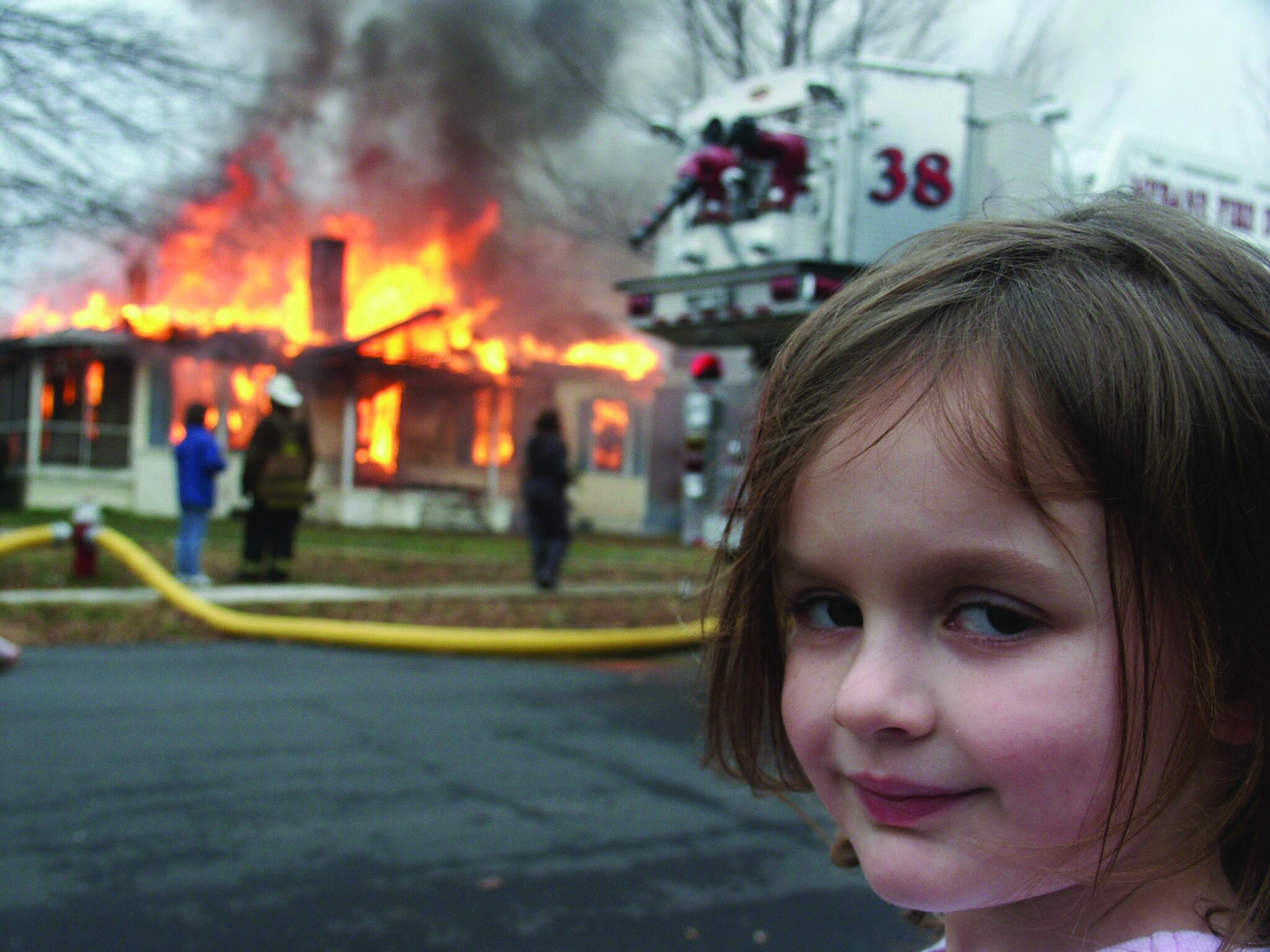
Zoe Taylor Roth ’21 has spent almost her entire existence seeing her 4-year-old face electronically plastered in front of catastrophes, like the sinking of the Titanic, the crash of the Hindenburg, the mushroom cloud of an atomic bomb and meteors wiping out the dinosaurs.
Disaster Girl laughs. How can she not? She’s just had the best year of her life.
Zoe Taylor Roth ’21 has spent almost her entire existence seeing her 4-year-old face electronically plastered in front of catastrophes, like the sinking of the Titanic, the crash of the Hindenburg, the mushroom cloud of an atomic bomb and meteors wiping out the dinosaurs.
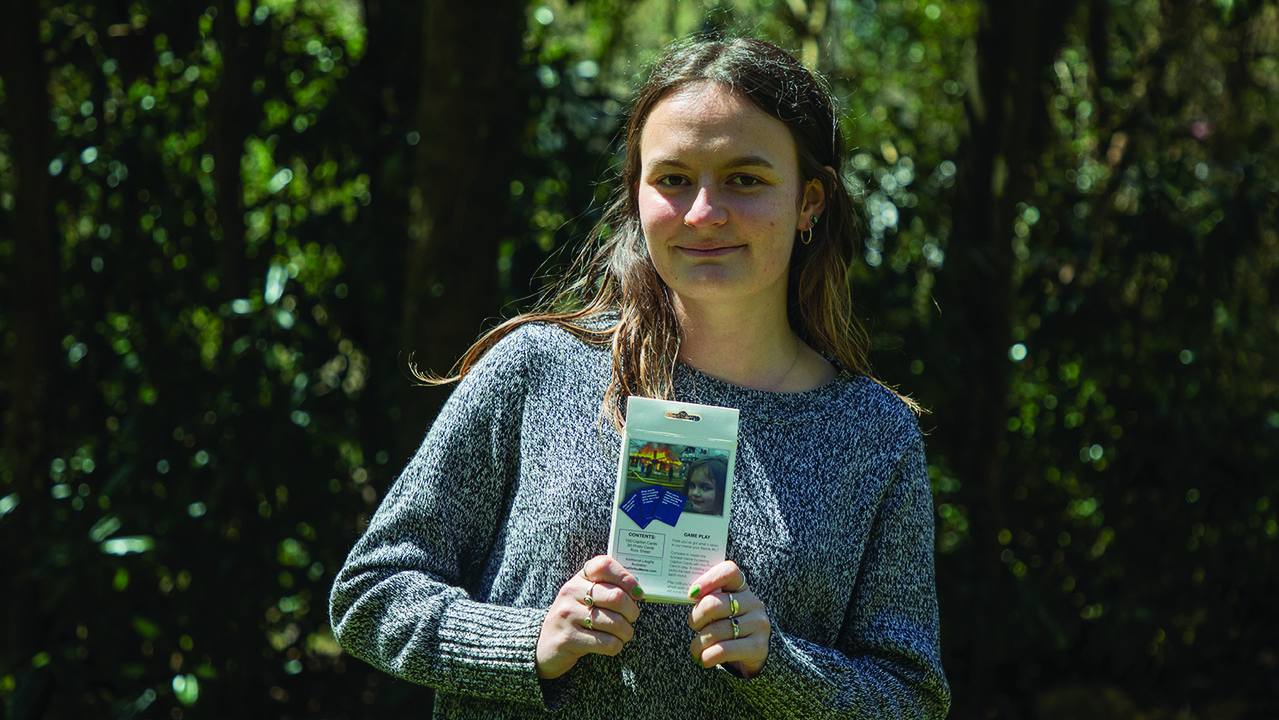
Roth holds a copy of the What Do You Meme? game in which players caption her childhood photo. Social media has been doing that since she was 4 years old. (Casey Toth/News & Observer)
Her enigmatic smile in a casual family photo has launched thousands, maybe millions, of memes implying calamities were her handiwork. The 21-year-old has found growing up as a social media phenomenon amusing, mostly.
“I can’t control how people are going to use my face,” Roth says, “so being upset is not a productive way to spend my time.”
This year, though, that image has brought her family a windfall. Here’s how an innocent smile became first the face of disaster — and then, a family’s good fortune.
Where there’s fire
In 2005, the Roth family strolled down the street near their Mebane home to watch an abandoned house go up in flames — courtesy of the local fire department. It was a controlled burn, a neighborhood event so casual that firefighters let kids hold the fire hose.
Zoe’s father, Dave Roth, had brought along his new camera and began clicking away. He snapped photos of his son, Tristan — whose distinctive round eyeglasses marked a Harry Potter phase — and of 4-year-old Zoe, who turned toward his lens with a Mona Lisa-like smile. With flames engulfing the house in the background, her otherwise angelic face took on the demonic satisfaction of an arson well done.
Dave later entered the photo in an “emotion capture” competition in JPG magazine — and won. When the photo was published, Zoe marched proudly into school. “Nothing has ever compared to being in second grade and taking my magazine to class,” she said. “That’s the most famous I ever felt.”
Little did she know.
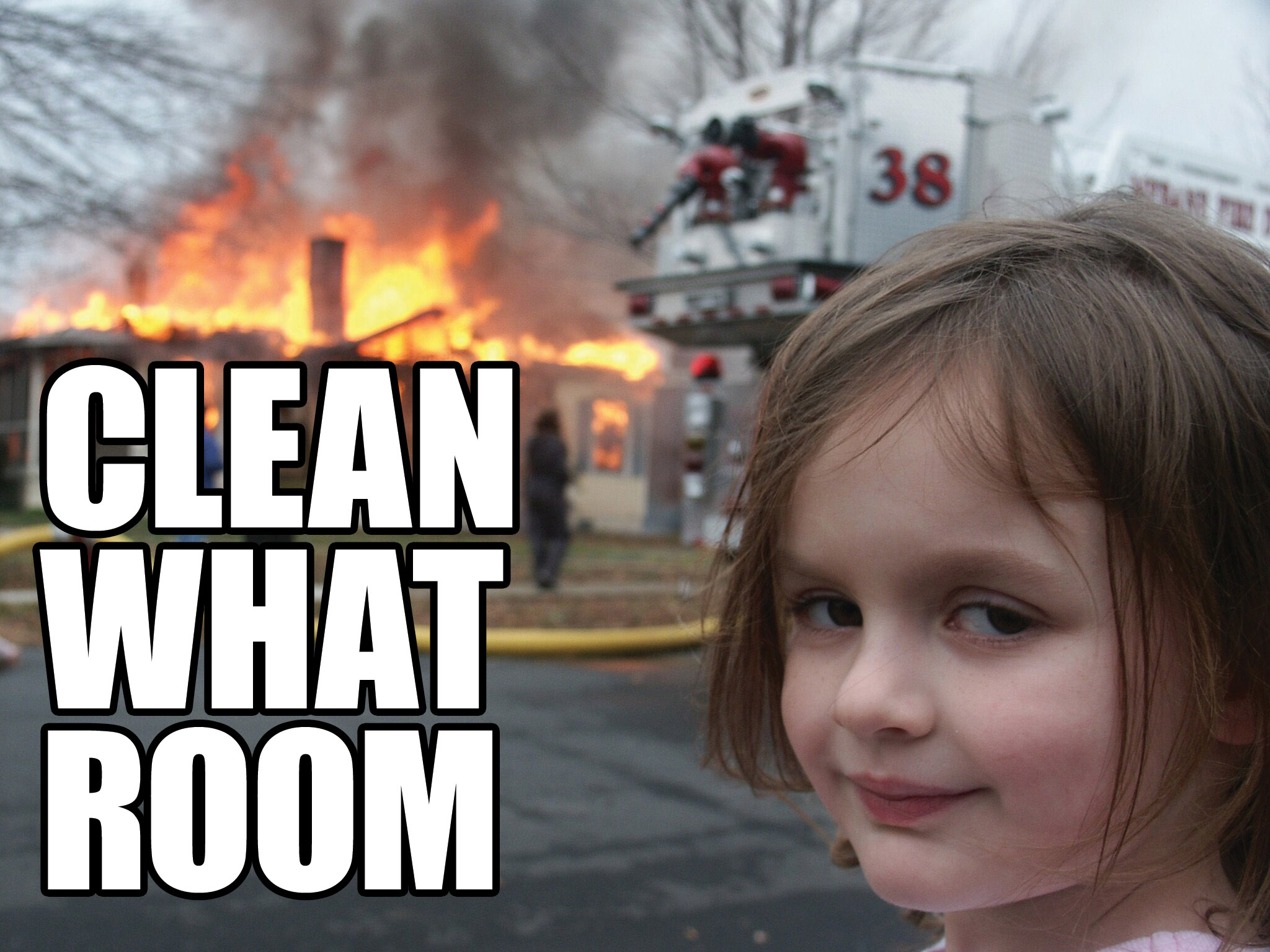 When Zoe was 8, her dad received an email from a fellow photo buff: The picture was popping up all over, including in a Photoshop contest on Fark.com, a social networking news site. A meme was born.
When Zoe was 8, her dad received an email from a fellow photo buff: The picture was popping up all over, including in a Photoshop contest on Fark.com, a social networking news site. A meme was born.
“At first it was just a matter of Zoe’s face as the foreground in front of something terrible,” Dave said. “Then at some point, it switched into the original photo with some kind of caption.” Instead of feeling upset or proprietary, he was delighted. “I’m in awe of people who are good at Photoshop.”
Meme vs. reality
The meme’s popularity surged and waned but never disappeared. When Zoe was 16, it was incorporated into the card game What Do You Meme?, and game nights across the country had players captioning her picture. Then came 2020 — the figurative dumpster fire of a year that seemed tailor-made for “Disaster Girl.” In addition to Zoe’s smile appearing in front of actual dumpster fires, the Roths’ picture toured through the social media universe in its original form with the house fire labeled “Earth” and Zoe labeled “Coronavirus.” It was the perfect image for the year’s cluster of crises.
The Roths had never received compensation for any of the ways Zoe’s image was used, and she had always played it down.
“It’s obviously a fun fact, but it’s not my defining trait,” she said. “I never use it as an icebreaker. There are other things I’d rather tell people.”
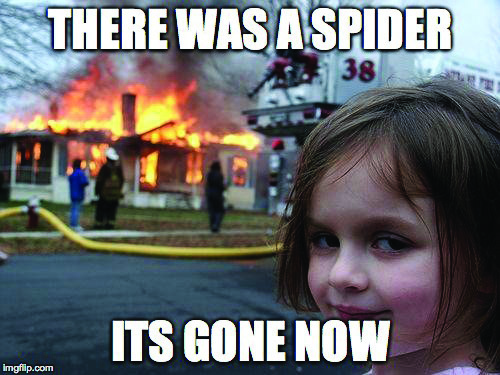 But as her face continued to hurtle around the internet, another actual-person-turned-meme suggested that the Roths sell the original image as a nonfungible token, or NFT. NFTs transfer electronic ownership rights through the cryptocurrency market. Respected auction houses that usually deal in paintings, sculptures and other solid works of art recently have sold NFT images for millions of dollars.
But as her face continued to hurtle around the internet, another actual-person-turned-meme suggested that the Roths sell the original image as a nonfungible token, or NFT. NFTs transfer electronic ownership rights through the cryptocurrency market. Respected auction houses that usually deal in paintings, sculptures and other solid works of art recently have sold NFT images for millions of dollars.
To the Roths, and to Zoe’s defining work ethic, the idea at first sounded like a scam. In real life — IRL, as memesters might say — Zoe had begun college at American University in Washington, D.C., where she worked three jobs to pay bills. Fluent in Chinese, having studied the language since kindergarten, she spent a summer in China as part of the State Department’s National Security Language Initiative for Youth. She co-founded an organization called RISE — Realizing Inclusivity and Student Excellence — that offered free SAT and ACT tutoring services for local high school students.
After she transferred to Carolina, she worked three or four shifts a week at Il Palio restaurant in Chapel Hill, scrimping and squirreling away whatever she could into, yes, a Roth IRA. She also was making plans for graduate study at the University of Ghent in Belgium and for the Schwarzman Scholars, a fully funded, one-year master’s degree and leadership program at Tsinghua University in Beijing.
“What is it in real money?”
After talking with an agent and a lawyer about a “Disaster Girl” NFT, though, the family decided to go for it. They agreed to divide the money four ways. While Zoe was the face in the photo, Dave had taken it, Tristan could just as easily have been “Disaster Boy” and Jennifer was — well, Mom. “It’s my family,” Zoe said. “I’m not going to try to take all the money.”
They listed the token for sale April 16 on the cryptocurrency platform Ethereum. The market can be volatile; at that time, each Ether was worth about $2,200. The auction would run for 24 hours, extended by 15 minutes every time there was a bid.
The first 23 hours were tame. Then things heated up.
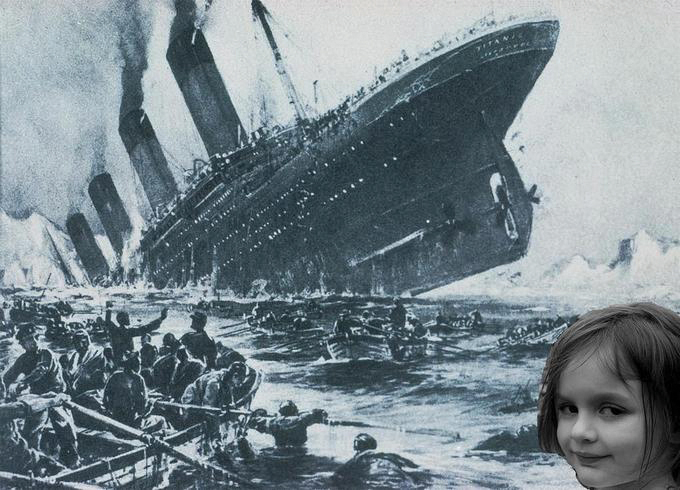 As the sale unfolded, Zoe stood at the Il Palio hostess stand, monitoring her phone to track the action. “I can take you to your table,” she’d say to a customer, then she’d scurry back to her station and check texts. At home, Dave carried his computer out to the calming sway of the front porch swing. He’d wanted to invite a few friends and family over to share in the excitement, but, “as Zoe would say, ‘That’s a weird flex,’ ” he said. “ ‘Want to come over and watch me make a bunch of money?’ ”
As the sale unfolded, Zoe stood at the Il Palio hostess stand, monitoring her phone to track the action. “I can take you to your table,” she’d say to a customer, then she’d scurry back to her station and check texts. At home, Dave carried his computer out to the calming sway of the front porch swing. He’d wanted to invite a few friends and family over to share in the excitement, but, “as Zoe would say, ‘That’s a weird flex,’ ” he said. “ ‘Want to come over and watch me make a bunch of money?’ ”
The last hour was a bidding war. Dave texted Jennifer: “You have to come out here and watch it with me. It’s insane.”
He spent the evening jumping up and yelling. Zoe spent it seating people and texting her dad: “What is it in real money?”
When the auction closed, it was at 180 Ether, which, depending on exchange rates, was about $400,000. It has since gone up. Dave and Jennifer paid off their house, and Tristan plans to replace his “junker” car and pay off his small college loans. Zoe will pay off her own loans but will leave the rest of her good fortune invested to grow. She’s traveling in Europe this summer but mostly sticking with the frugal plans she made when she was broke. She’ll keep her job, too.
“I have to rethink how my brain works,” said Zoe, who is graduating with a bachelor’s degree in peace, war and defense and a minor in Chinese. “I work. That’s what I do. I love all the people I work with, and I’m not going to leave them. For so long, I’ve been budgeting and planning what I can and can’t do, but now, I don’t really have to. When it sold, people asked, ‘Are you going to walk out?’ My parents said, ‘Don’t quit, act like you don’t have this.’ ”
So she stayed at Il Palio. But she’s still smiling that smile.
— Janine Latus
Thanks for reading the Carolina Alumni Review
Carolina Alumni members, sign in to continue reading.
Not yet a member? Become one today.
